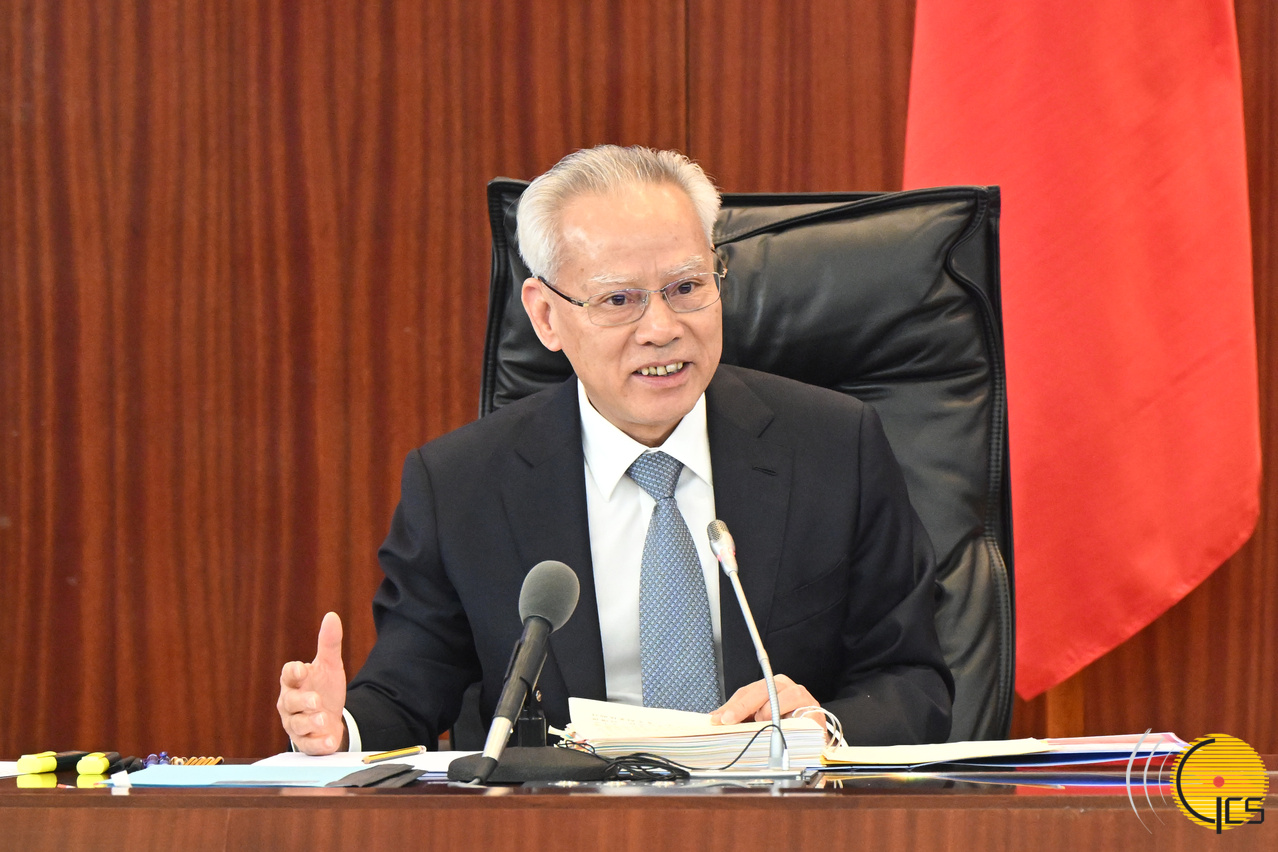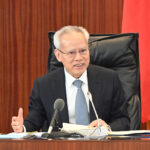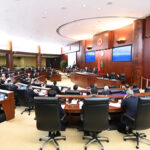 The Chief Executive, Mr Sam Hou Fai, attends a question-and-answer session of a plenary meeting of the Legislative Assembly to take questions from legislators regarding the 2025 Policy Address.
The Chief Executive, Mr Sam Hou Fai, attends a question-and-answer session of a plenary meeting of the Legislative Assembly to take questions from legislators regarding the 2025 Policy Address.
The current-term Macao Special Administrative Region (MSAR) Government is adopting a multi-pronged approach to alleviate people’s hardships and improve livelihoods, creating quality living conditions.
This is according to the Chief Executive, Mr Sam Hou Fai, who made the pledge this afternoon at the Legislative Assembly, during a question-and-answer session relating to the Policy Address for the Fiscal Year 2025. Mr Sam answered legislators’ questions on social issues ranging from a declining birth rate to care of the elderly, targeted assistance to disadvantaged groups, investment in educational resources, protection of employment for local residents, and youth policies.
The Government attaches great importance to policies relating to the elderly and to the young, noted Mr Sam. The Chief Executive added that the Government had always been concerned about the impact of ageing within the population, in relation to Macao's sustainable development. The Government will improve the efficiency of services for the elderly and effectively respond to related needs, through the provision of diversified services, he said.
The budget on regular subsidies for services for the elderly stood at 560 million patacas in 2024, accounting for approximately 33 percent of the budget spent on regular subsidies for social services in Macao.
Relevant departments are currently carrying out planning and preparation work for the next phase of the 10-Year Action Plan for Services for the Elderly, focusing on “Big Health”, smart technology, and an elderly-friendly and inclusive environment, according to the Chief Executive.
The Government will also launch or increase training courses on care for the elderly via various higher education institutions, to meet the rising demand for such care, brought about by an ageing population, he added.
Mr Sam revealed that the Government will strive to complete the assessment work related to the proposal for a dedicated consumer price index for the elderly. The Government will also review indicator parameters for any adjustment mechanism regarding increases to subsidies for the elderly; it will also explore related issues such as linking the pension baseline with the index for minimum standard of living for the elderly.
Regarding the issue of a low birth rate in Macao, Mr. Sam pointed out that the Government will launch a childcare subsidy scheme to encourage parenthood, providing a subsidy of 1,500 patacas per month, i.e., a total of 18,000 patacas per year, to cover children under the age of three born to Macao permanent residents.
It is estimated that more than 15,100 children will be covered by the scheme in 2025, via a budget of approximately 270 million patacas. The 2025 Policy Address also mentions raising the birth allowance to 6,500 patacas, an increase of nearly 20 percent.
Meanwhile, a subsidy scheme on medically-assisted reproductive services has been launched. The Government has also improved childcare services, providing more than 240 million patacas in yearly-recurrent funding for subsidised childcare institutions, providing an average of approximately 34,000 patacas per childcare place. Support for disadvantaged families includes provision of 900 free daycare places plus fee reductions, and priority admission to daycare services.
Regarding maternal and child health services and support for working families, the Government will study the feasibility of increasing maternity leave and annual leave. It plans to entrust an independent third-party organisation to conduct research on the issue, in order to build social consensus on the matter. The Government will also make full use of public housing resources to provide support to families with children, the Chief Executive said.
Mr Sam stressed that the Government will provide support and care to families in need, and provide encouragement – via a series of polices and services – for young adults to have children. The Government will also continue to care for vulnerable groups and ensure that they are taken care of in their old age, he added.
In terms of improving the healthcare system, the Government will work with non-profit medical institutions to increase the number of subsidised treatment sessions that can be offered to the public. The Government will increase the number of subsidised community outpatient clinic sessions to approximately 180,000, and the number of psychological treatment quotas to 10,000. The Government will also strengthen tripartite collaboration between public, non-profit and private healthcare institutions, to refer chronic disease patients from health centres to community clinics at non-profit healthcare institutions.
In terms of education, the Government will continue to increase investment in education resources: the combined budgets of the Education and Youth Development Bureau and the Education Fund will be increased to a total of approximately 9.6 billion patacas in 2025.
The Government will continue to implement the policy of “developing Macao through education and building Macao through talents”. It will give priority to the development of free education, regulate the number of places and classes in each school, support financial measures for schools with disadvantaged pupils, and enhance the stability and adaptability of the education system.
Mr Sam said that in order to develop new quality productive forces, the Government will put education, technology and talent training together for policymaking purposes. In this regard, the Government will promote the development of smart education through "smart campuses", "smart teaching" and "artificial intelligence education". It will strengthen teacher training, and in turn popularise science and technology training for students.
Regarding job security, the Chief Executive pointed out that structural unemployment and job prospects of young graduates are issues of concern. The Government will continue to introduce various employment support measures and services to assist residents in finding employment through multiple channels. The Government will also study the establishment of a comprehensive vocational training platform to respond to industry adjustments and allocate relevant resources in a targeted manner.
He stressed that the Government will ensure that local residents are given priority in employment, and that the importation of non-resident workers is only to address the shortage of local manpower.
The 2025 Policy Address mentions that welfare policies need comprehensively to take into account multiple factors such as economic and social development, as well as fiscal revenues, and balance the relationship between short-term expenditures and sustainable development.
Mr Sam pointed out that the fixed expenses of the Government are large. However, gaming revenues in the first quarter did not meet the expected average monthly target stated in the 2025 Fiscal Budget. If subsequent gaming revenues still do not meet the target, the Government will face a budget deficit. As 80 percent of the Government’s tax revenues come from the gaming industry, the Government must respond prudently to various risks and challenges, and make good use of Macao’s unique advantages in order actively to promote appropriate economic diversification, stated the Chief Executive.



